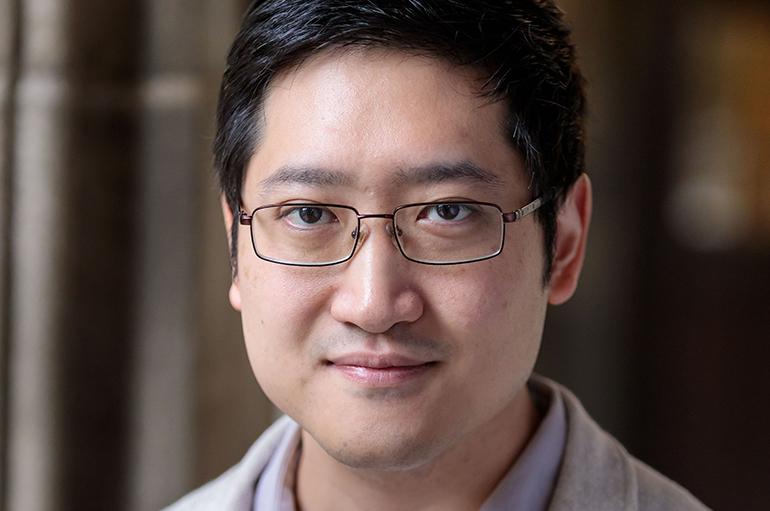
Composer Anthony Cheung, Assistant Professor of Music and the Humanities, who joined the Chicago faculty in the fall of 2013, has accepted a faculty position at Brown University.
“During his seven years at Chicago, Anthony has been a wonderful colleague and teacher, whose music and musicality have brought distinction to our department, and whose thoughtfulness, integrity, and imagination have been cherished in his roles as advisor, administrator, and Co-Director of the Grossman Ensemble at the Chicago Center for Contemporary Composition,” says Department Chair Berthold Hoeckner.
Since moving to Chicago and joining the Department’s faculty, Cheung has experienced many career highlights, both on campus and off. In 2014, he helped to organize a colloquium and concert for the late composer Chou Wen-Chung; Cheung and members of Ensemble Dal Niente performed Chou’s music for him in the Logan Center for the Arts on one of the last occasions that he left his home in New York. Cheung also had the honor of hosting a colloquium for composer George Lewis in front of a standing-room only audience as part of the 2016 Ear Taxi Festival. In 2015, he was commissioned to create a new piece for the University's 125th anniversary, and the work for spatialized ensembles was premiered at the 525th convocation exercises.
In the 2017-18 academic year, Cheung created a new seminar course, “The Jazz Orchestra and Orchestral Approaches to Jazz,” forming an ad-hoc big band to play student pieces, thanks to the persistence and enthusiasm of graduate student in ethnomusicology, Jonah Francese. An accomplished pianist of classical music and jazz, Cheung later performed with Francese and another doctoral student in ethnomusicology, Jacob Secor, in a program of student compositions on the weekly Tea Time Concerts series. Other performance highlights at the University include playing with saxophonist and composer Steve Lehman, a graduate school colleague of Cheung’s; performing with the Pacifica Quartet, long-time ensemble in residence in the Department of Music; and collaborating with his wife Wang Lu on an improvised score to the newly restored silent film travelogue, “A Trip to China,” co-sponsored by the Film Studies Center and Center for East Asian Studies.
In 2018, Cheung worked with Associate Professor Seth Brodsky and Assistant Professors Jennifer Iverson and Sam Pluta to mount a three-day symposium on the life and work of György Ligeti, in collaboration with the University of Chicago Presents’ series celebrating the composer’s music. Since 2018, he has helped plan the annual three-concert series of Grossman Ensemble at the Chicago Center for Contemporary Composition, together with his colleagues in composition University Professor Augusta Read Thomas and Assistant Professor Sam Pluta.
During this time at Chicago, Cheung garnered prestigious awards and high-profile performances of his work. From 2015 to 2017, he served as the Daniel R. Lewis Composer Fellow of the Cleveland Orchestra, and in the 2016-17 academic year, he was a Guggenheim Fellow. In 2014, his work “Lyra” was premiered by the New York Philharmonic, commissioned at the request of the orchestra’s first Kravis Prize recipient, Henri Dutilleux. He has also released three “portrait” discs of his music over the years: Roundabouts (Ensemble Modern, 2014), Dystemporal (Wergo, 2016), Cycles and Arrows (New Focus, 2018).
“Anthony is a kind, lovely person and an excellent musician from whose wisdom, generosity, friendship and skills we’ve all learned a great deal,” says Professor Augusta Read Thomas. “It is natural, and to his credit, that he wants to be with his wife, Lu and daughter, Mirabel. We wish him every possible blessing in his new environment, endeavors, and works. We miss Anthony already and we always welcome him back warmly.”
Cheung will be joining the faculty of the Brown University Department of Music, where his wife Wang Lu is also on faculty. At Brown, Cheung will continue to teach and advise young composers in private lessons, and he will also teach courses in music theory and seminar courses for both undergraduate and graduate music students. He also hopes to develop future cross-disciplinary courses in literature, aesthetics, and Asian American studies.
“It’s been a real privilege to teach, and consequently, to learn in this department,” says Cheung. “The students and faculty have collectively opened up my way of thinking and listening in and beyond sound, in ways that have had an immediate impact on my own work and being. Also, this place sets a gold standard for interdepartmental dialogue, collegiality, and community, an attitude I’ll try to take with me. While I do feel sadness in leaving, my heart is warmed by the thought of following the students’ and faculty members’ continued projects and successes into the future. Thanks for a most memorable seven years.”
